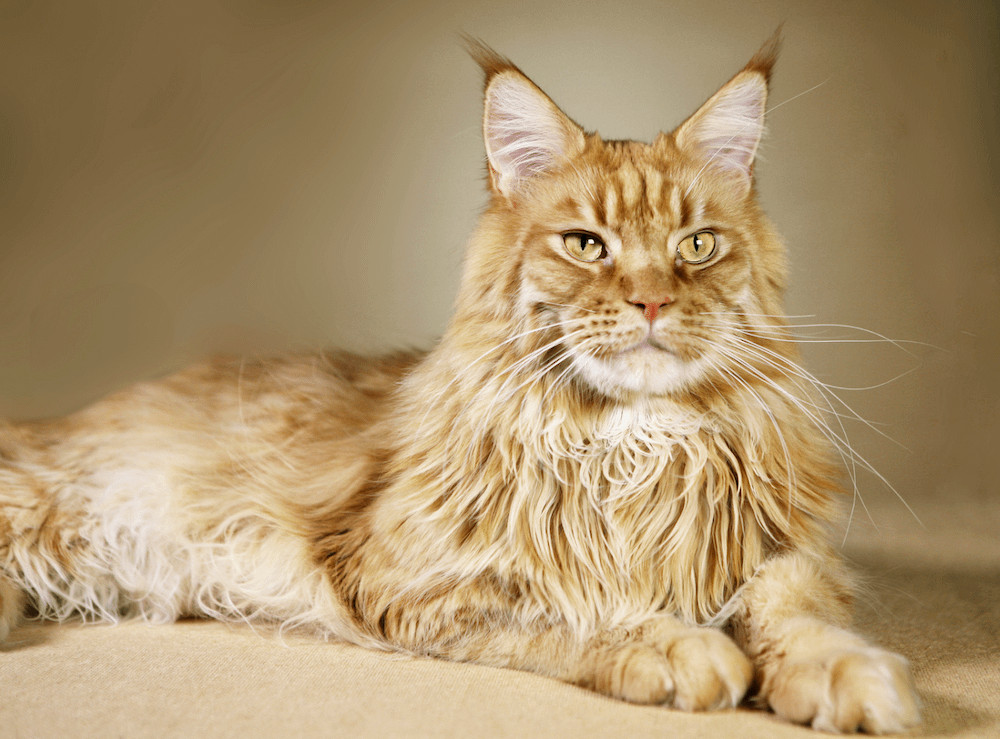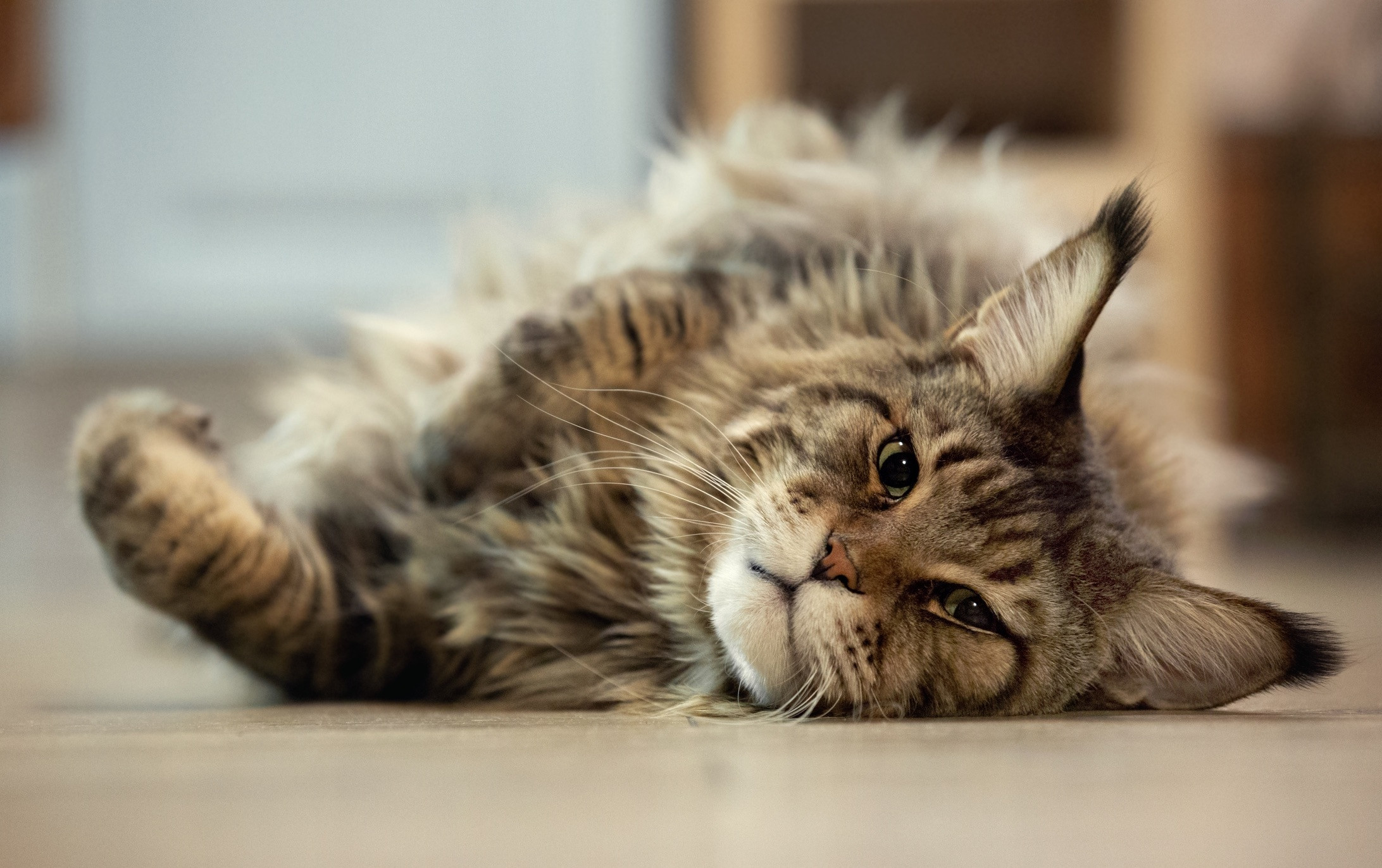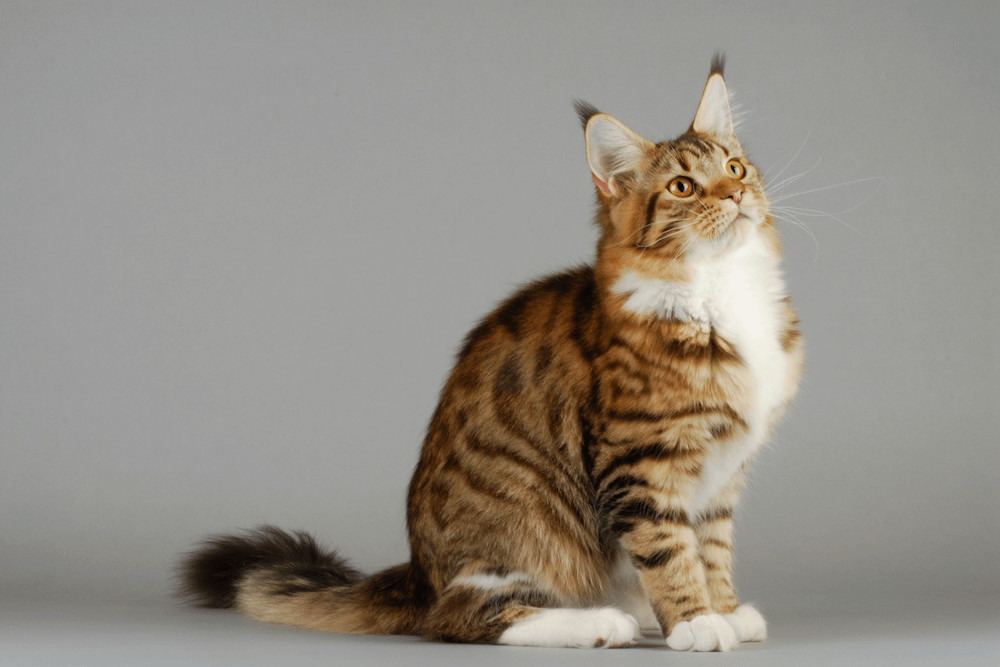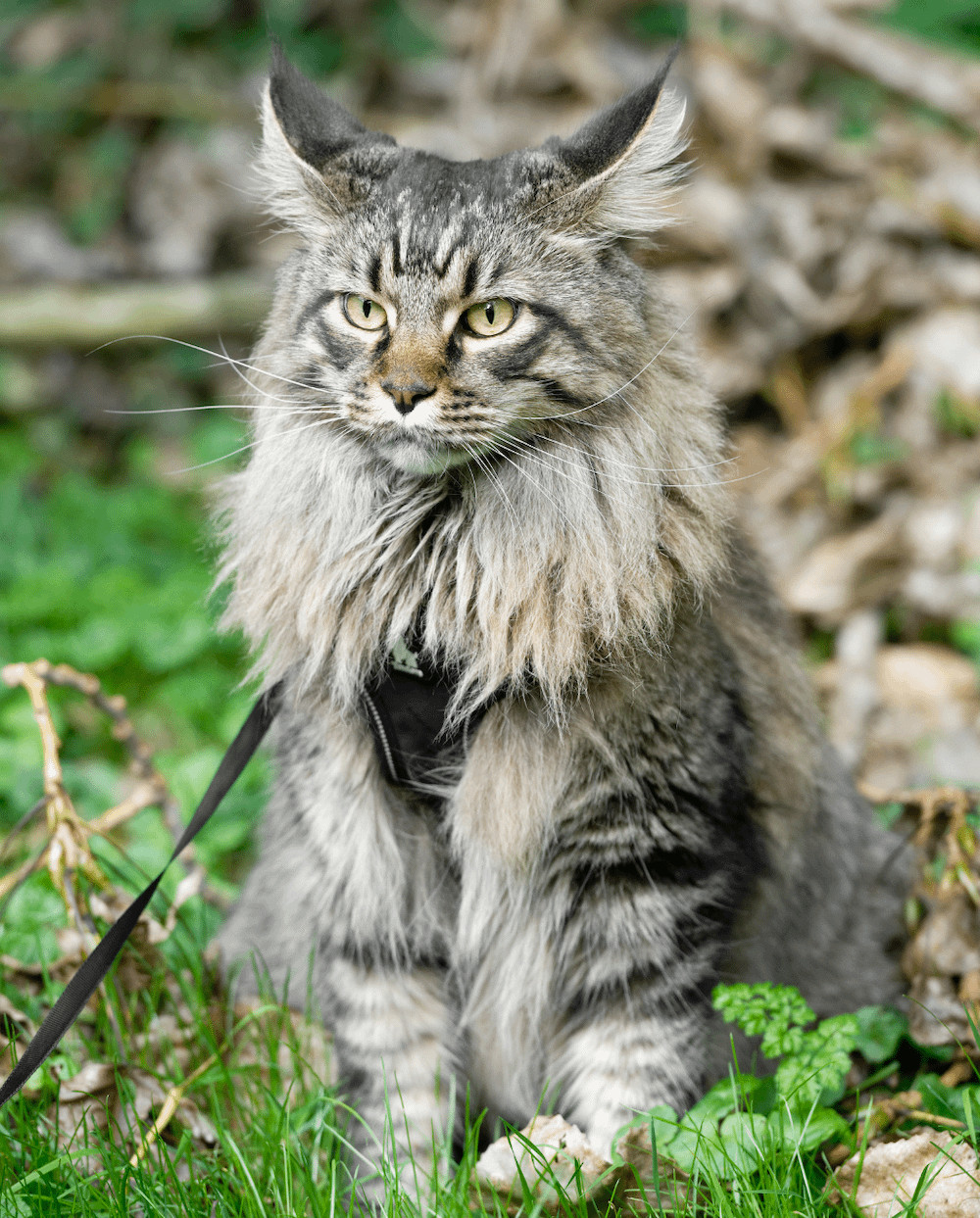The Maine Coon cat, a breed celebrated for its impressive size and amiable nature, holds a special place in the hearts of cat lovers globally. Recognized as the state cat of Maine and often lauded as the longest domestic cat breed, these felines are more than just their striking physical attributes. Their gentle temperament and often polydactyl paws further contribute to their endearing charm.
Given their status as one of the largest domestic cat breeds, a common question arises among prospective and current Maine Coon parents: How Long Do Maine Coon Cats Live? It’s a natural concern, especially when considering the common misconception that larger breeds, similar to dogs, might have shorter lifespans. Let’s delve into the factors influencing a Maine Coon’s lifespan and what you can expect for your gentle giant.
Understanding the longevity of your feline companion involves considering several key elements. Nutrition plays a pivotal role, as does ensuring they get adequate exercise. Genetic predispositions to certain health conditions and consistent, proper grooming are also crucial. By being proactive and providing optimal care, you can significantly contribute to your Maine Coon enjoying a long, healthy, and fulfilling life by your side.
Before welcoming a Maine Coon into your home, it’s wise to be fully aware of their specific needs. Educating yourself about their care requirements is not just about responsible pet ownership; it’s an investment in extending the precious years you’ll share with your furry friend.
 Cream Maine Coon cat
Cream Maine Coon cat
Alt text: A majestic cream Maine Coon cat with piercing eyes gazes directly at the camera, showcasing its long fur and tufted ears.
Decoding the Maine Coon Lifespan
Generally, a healthy Maine Coon living primarily indoors can anticipate a lifespan ranging from 12 to 15 years. When compared to the average lifespan of an indoor domestic cat, which also falls within the 10 to 15-year bracket, it’s reassuring to know that Maine Coons are right on par.
Contrary to the trend observed in dog breeds, the size of a cat breed doesn’t directly correlate with a shorter lifespan. This is less surprising when we consider that the weight difference between smaller and larger cat breeds is relatively modest, typically around 10-15 pounds. This contrasts sharply with the canine world, where size variations can lead to weight differences exceeding 100 pounds, often impacting longevity.
Maine Coons are known for their playful and friendly cat personalities. They thrive on interaction with their human families, although they are not overly demanding of constant attention. While they are adept at self-entertainment, daily engagement in play and exercise with family members is beneficial for their well-being.
Like many cat breeds, Maine Coons are susceptible to certain health conditions. Regular veterinary check-ups are therefore vital for early detection and management of any potential health issues, ensuring they live a long and vibrant life.
Unpacking the Maine Coon Breed: Beyond Size
The Maine Coon cat stands out as one of the largest, if not the largest, natural domestic cat breeds. Their weight typically ranges from 10 to 18 pounds, but some of the largest Maine Coons can reach up to 25 pounds or even more.
However, the breed’s appeal extends far beyond mere size. Their rich history and captivating personality contribute significantly to their enduring popularity. Let’s explore the fascinating facets of the Maine Coon.
Maine Coon Origins: History Unveiled
The history of the Maine Coon is shrouded in folklore, with numerous captivating, albeit fanciful, theories surrounding their origin. One popular myth suggests they are the result of matings between domestic cats and raccoons. Other legends propose Viking ships bringing long-haired cats to America or that they descended from Marie Antoinette’s Turkish Angora cats sent to America before her ill-fated escape attempt.
The more plausible narrative points to a natural, centuries-long development starting as early as the 1600s. It’s believed that Maine Coons evolved through the interbreeding of domesticated American Shorthair cats with long-haired breeds brought over by sailors. Their dense, water-resistant coat and robust, muscular build made the Maine Coon perfectly suited for the harsh New England winters.
For centuries, these hardy felines served as invaluable hunters, diligently controlling vermin populations in barns and homes across Maine. Over time, their affectionate and playful nature earned them a place indoors as cherished family companions.
Distinctive Maine Coon Characteristics
As previously mentioned, the large size of Maine Coon cats is a defining trait. Beyond their weight, they hold the record for length among cat breeds, typically measuring between 30 and 40 inches. The record for the longest Maine Coon stretched an astounding 48.5 inches.
Their fur is another striking feature – thick, shaggy, and capable of presenting in a wide array of colors and patterns. A prominent fluffy ruff adorns their chest, and they possess large paws which are frequently polydactyl, meaning they have extra toes. These enlarged paws were likely an evolutionary advantage for navigating snowy terrains and enhancing their hunting and climbing abilities.
 Maine Coon cat playing outside
Maine Coon cat playing outside
Alt text: A playful Maine Coon cat with tabby markings is captured mid-leap in a garden setting, showcasing its agility and thick fur.
Maine Coon Temperament: A Gentle Giant’s Personality
Despite their history as working cats, Maine Coons are now primarily celebrated for their adaptable, playful, and friendly temperaments. They are remarkably easygoing, typically getting along well with children, other pets, and even strangers. Their dog-like playfulness is a hallmark of the breed; they can often be trained to perform tricks like fetching and can even be walked on a leash.
Maine Coons strike a wonderful balance in a family environment. They are spirited without being overly hyperactive, affectionate but not constantly demanding of attention, and vocal (often chirping or trilling rather than meowing loudly) without being excessively noisy.
Health Concerns to Be Aware Of
While generally robust, Maine Coons are predisposed to certain health conditions. Being informed about these potential issues is crucial for proactive health management and ensuring timely intervention if necessary.
Hip dysplasia, a condition resulting from abnormal hip joint development, can lead to lameness and limping in Maine Coons. Poor hip alignment causes discomfort and limits physical activity. Hip dysplasia can also accelerate the onset of arthritis, a condition often underdiagnosed and undertreated in felines.
Like many breeds, Maine Coons can develop hypertrophic cardiomyopathy (HCM), a heart condition where the heart muscle thickens excessively. Over time, HCM can impair heart function and potentially lead to serious heart disease in cats. They are also more prone to polycystic kidney disease (PKD), an inherited disorder characterized by cyst formation on the kidneys, potentially leading to kidney disease.
Spinal muscular atrophy (SMA) is a genetic condition specifically affecting Maine Coon kittens and cats. SMA causes progressive degeneration of spinal muscles, becoming apparent around 3-4 months of age through muscle weakness and gait abnormalities. While not painful, SMA can be disabling and requires supportive care.
 Brown tabby Maine Coon
Brown tabby Maine Coon
Alt text: A close-up portrait of a brown tabby Maine Coon cat, highlighting its expressive face, prominent muzzle, and long whiskers.
Nurturing a Long and Happy Life for Your Maine Coon
While Maine Coons are known for their independent streak, they still thrive on attention and care. To maximize their lifespan and happiness, providing a stimulating and nurturing environment is key. Even with their easygoing nature, they appreciate and benefit from interaction and enrichment.
Providing daily physical and mental stimulation is essential. Even when you’re not home, ensuring they have opportunities for engagement is important for their overall well-being.
Interactive Play and Enriching Furniture
Maine Coons are naturally playful and have hearty appetites, meaning they need sufficient exercise to maintain a healthy weight. Engage them in active play using laser pointers, cat wands, and various ball toys, and consider adding catnip to elevate playtime excitement. Puzzle feeders can provide mental stimulation and entertainment while you are away. Cat furniture, such as cat trees and scratching posts, allows them to climb, observe their surroundings from a high vantage point, and satisfy their scratching instincts on appropriate surfaces.
Outdoor Adventures (Safely)
While keeping cats indoors is generally recommended for safety, Maine Coons, with their adaptable nature and protective coats, can enjoy supervised outdoor excursions. Training your Maine Coon to walk on a leash opens up a world of outdoor exploration. These outings provide valuable physical and mental stimulation beyond what’s achievable indoors. Always ensure they are securely leashed and kept up-to-date on heartworm, flea, and tick preventatives.
 Grey tabby Maine Coon on a leash outside
Grey tabby Maine Coon on a leash outside
Alt text: A grey tabby Maine Coon cat confidently explores the outdoors while wearing a leash, showcasing its adaptability and adventurous spirit.
Balanced Nutrition for Longevity
Maine Coons are naturally large, but overfeeding can lead to obesity, exacerbating their predisposition to certain health conditions. Maintaining a healthy weight is crucial for their longevity.
Consider using an automatic pet feeder to regulate portion sizes and ensure consistent, appropriately sized meals throughout the day, helping to prevent overeating.
Consistent Grooming Practices
The Maine Coon’s luxurious long, thick fur requires regular grooming to prevent matting and tangles. Weekly brushing or combing is usually sufficient, but during shedding seasons (spring and summer), daily grooming may be necessary to manage shedding effectively.
Regular nail trimming (at least monthly) and dental care are also important. While brushing their teeth at home is ideal, professional veterinary dental cleanings are often necessary to maintain optimal oral health.
Regular Veterinary Wellness Checks
Routine veterinary check-ups are paramount for maintaining your Maine Coon’s health and extending their lifespan. Annual vet visits are recommended for cats under 10 years old (or more frequently if they have pre-existing health issues), and twice-yearly check-ups are advisable for senior cats.
Given their breed-specific health predispositions, vigilant monitoring for any changes in their physical condition or behavior is crucial. Smart pet technology, such as app-connected self-cleaning litter boxes and feeders, can help track your cat’s habits and alert you to potential health changes that warrant veterinary attention.
Welcoming Years of Companionship with Your Maine Coon
With proper care, a Maine Coon cat can grace your life with many years of joyful companionship. Providing ample affection, engaging playtime, and attentive care to their needs and habits are the cornerstones of ensuring a long and healthy life for your feline friend. The magnificent Maine Coon deserves a loving and devoted home—and if you can offer that, you’re indeed fortunate to share your life with such a remarkable creature.
